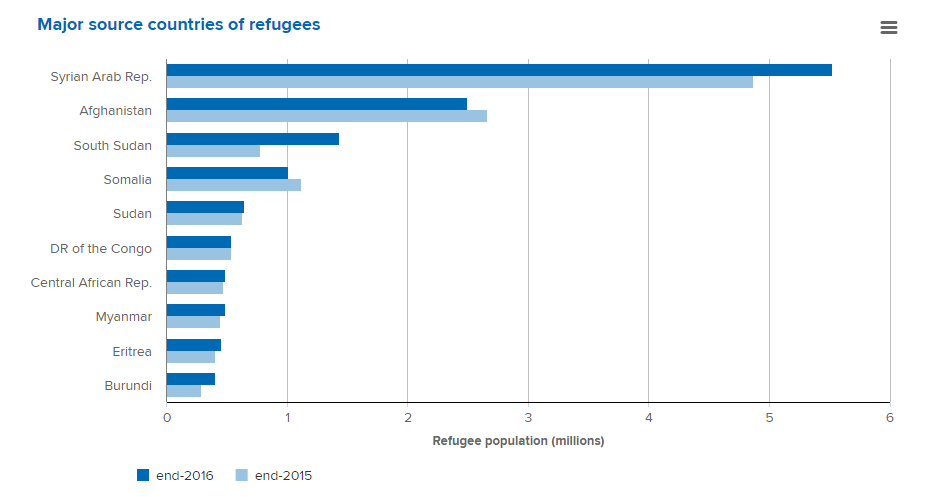The number of displaced people in the world just hit a record high

2016 broke the world record for the numbers of displaced persons around the globe
Image: REUTERS/Mandel Ngan/Pool
Stay up to date:
Migration
One in every 113 people on the planet is now a refugee. Around the world, someone is displaced every three seconds, forced from their homes by violence, war and persecution.
By the end of 2016, the number of displaced people had risen to 65.6 million - more than the population of the United Kingdom. The number is an increase of 300,000 on the year before, and the largest number ever recorded, according to the UN Refugee Agency, UNHCR.
Within this figure are different types of refugee. Most - 40.3 million - are people displaced within their own country, according to the UNHCR’s annual Global Trends report. This is a slight dip on the year before, but the figure still makes up almost two thirds of the total global refugee count. Most of these people are based in war-torn Syria and Iraq, alongside those uprooted by conflict in Colombia.
Refugees who have fled to another country make up the next biggest group, which at 22.5 million people is the highest number ever recorded. Predictably, Syria, now in its seventh year of conflict, is generating the highest number of refugees. Five and a half million fled the country last year. But over the course of 2016, South Sudan became a major new source of refugees after the breakdown of peace efforts in July contributed to 739,900 people crossing the border by the end of the year. Since then, the number of people who have left has climbed to 1.87 million people.
Finally, there are 2.8 million asylum seekers, refugees that have fled their own country and are seeking protection elsewhere.
The number of refugees continues to grow
Worryingly, the number of people being displaced continues to grow. Of the total refugee count in 2016, 10.3 million of them became refugees that year.
But, on a more positive note, thousands of people were able to return to their homes in 2016, and many others managed to resettle in other countries. About half a million refugees returned to their home countries, and around 6.5 million of those that had fled within their own countries were able to go back to their own region - although many did in less than ideal circumstances and face an uncertain future.
Accept our marketing cookies to access this content.
These cookies are currently disabled in your browser.
Don't miss any update on this topic
Create a free account and access your personalized content collection with our latest publications and analyses.
License and Republishing
World Economic Forum articles may be republished in accordance with the Creative Commons Attribution-NonCommercial-NoDerivatives 4.0 International Public License, and in accordance with our Terms of Use.
The views expressed in this article are those of the author alone and not the World Economic Forum.
Forum Stories newsletter
Bringing you weekly curated insights and analysis on the global issues that matter.
More on Geographies in DepthSee all
Aimée Dushime
April 18, 2025
Samir Saran and Anirban Sarma
April 17, 2025
Nada AlSaeed
April 16, 2025
Zhang Xun and Vee Li
April 8, 2025
Abdulwahed AlJanahi
March 3, 2025
Naoko Tochibayashi and Mizuho Ota
February 28, 2025








